Delay in Your Bitcoin Transaction? Here’s What You Need to Know
Fed up of Bitcoin transaction delays? You’re not alone. Every day, thousands of users across the U.S. find themselves staring at their wallets, wondering why their Bitcoin transaction is not confirming or why it’s been stuck for hours in the mempool.
In 2025, as crypto adoption grows, these issues are more common than ever. Whether you’re sending funds to an exchange or transferring to a cold wallet, encountering a Bitcoin transaction stuck in limbo can be nerve-racking. The good news? You’re not powerless.
This guide will walk you through everything — from why your Bitcoin transaction is delayed to what causes Bitcoin mempool issues and, most importantly, how to speed up a Bitcoin transaction when it’s hanging in the balance. If you’re tired of uncertainty and need real solutions, you’re in the right place.
Table of Contents
🔍 How Bitcoin Transactions Work (And Why They Sometimes Get Stuck)
To understand why a Bitcoin transaction is delayed, it’s important to know what happens under the hood when you hit “Send.” Picture the Bitcoin network as a massive freeway. Your transaction is a car trying to merge into traffic. If there’s congestion—or your fee is too low—you’ll likely end up with a Bitcoin transaction stuck in the queue.
When you send Bitcoin, it first enters the mempool—a holding zone where all unconfirmed transactions wait. Think of it like a parking lot before the toll gate. The miners act as gatekeepers, selecting which cars (transactions) to let through. Naturally, they pick the ones that offer the highest toll (or transaction fee).
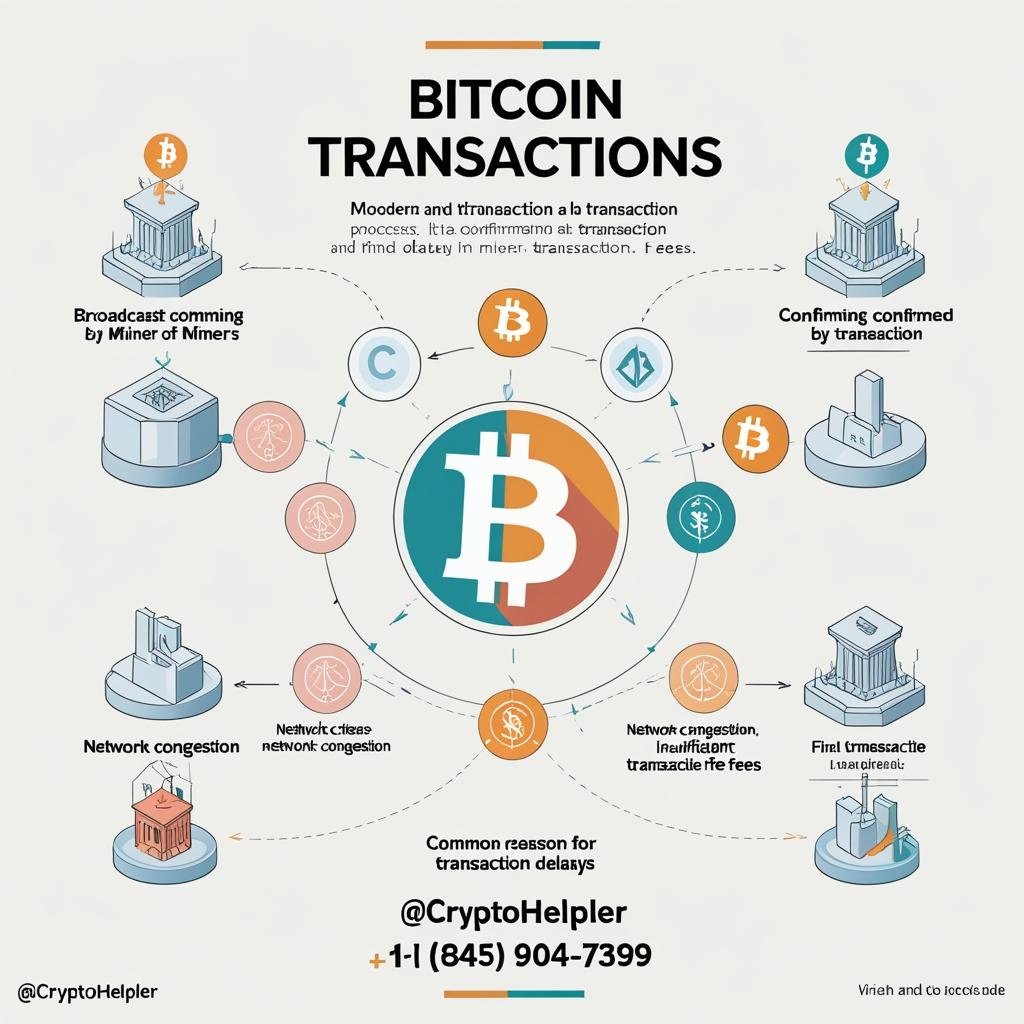
So, when the network is busy or you’ve paid too little, you may notice your Bitcoin transaction is not confirming. This delay can last from minutes to hours depending on how full the mempool is. These are known as Bitcoin mempool issues, and they’re the most common reason users see their funds hanging in limbo.
If you’re experiencing this and want to regain control, it’s essential to know how to speed up a Bitcoin transaction. We’ll show you several proven methods in the sections below.
⏱️ Common Reasons Why Your Bitcoin Transaction Is Delayed
There’s nothing more frustrating than seeing your Bitcoin transaction delayed with no idea why it’s not moving. While the blockchain is designed for reliability, several real-world factors can cause your Bitcoin transaction to get stuck or remain unconfirmed for hours—or even days.
🚨 1. Low Transaction Fee
The most common reason a Bitcoin transaction is not confirming is a low fee. If your wallet sets a default fee that’s below the current market rate, miners are less likely to include your transaction in the next block. During network congestion, this often leads to Bitcoin transaction delays.
🚧 2. Bitcoin Mempool Issues
When the Bitcoin network is flooded with unconfirmed transactions, the mempool becomes overloaded. These Bitcoin mempool issues create a backlog, and transactions with low priority fees can get pushed to the bottom of the queue, causing even properly sent payments to experience significant delays.
🛑 3. High Network Activity
Events like market crashes, pump-and-dump cycles, or major exchange outages can trigger a spike in transaction volume. When this happens, users around the world report their Bitcoin transaction stuck in the mempool for hours. Even transactions with moderate fees may face confirmation delays under these conditions.
⚡ 4. How to Speed Up Bitcoin Transaction Processing
If you find your Bitcoin transaction is delayed, don’t panic—there are ways to fix it. We’ll cover techniques like Replace-by-Fee (RBF), Child Pays for Parent (CPFP), and using transaction accelerators to help you understand how to speed up Bitcoin transaction confirmations quickly and safely.
📊 How to Check Your Bitcoin Transaction Status Like a Pro
If you suspect your Bitcoin transaction is delayed, the first step is to confirm what’s actually happening. Many users panic when they see their balance hasn’t updated, but the issue might just be a confirmation delay due to a slow network. Before assuming your Bitcoin transaction is stuck or lost, take a minute to check its real-time status.
🔍 Step 1: Get the Transaction ID (TXID)
Most wallets and exchanges provide a unique TXID for each transaction. This lets you track your transfer across the blockchain.
🛰️ Step 2: Use a Blockchain Explorer
Head to a site like blockchain.com or mempool.space and paste your TXID. You’ll be able to see if your transaction has been broadcasted, how many confirmations it has, and whether it’s waiting in the mempool—a common cause of Bitcoin transaction delays.
⚠️ Step 3: Understand Confirmation Delays
If your transaction shows zero confirmations and has been sitting for over an hour, you’re likely facing a **Bitcoin transaction not confirming** issue. This usually points to low fees or overall **Bitcoin mempool issues**. Don’t worry—we’ll cover exactly how to speed up Bitcoin transaction confirmations in the next section.
🛠️ Step 4: Check Network Conditions
Use mempool trackers to see how congested the network is. If thousands of unconfirmed transactions are ahead of yours, your <stro
💡 Pro Tip:
Use the mempool explorer fee estimation to understand what fee you should have used. This helps you plan or fix future transactions.
🔧 Fixes You Can Try When Your Bitcoin Transaction Is Delayed
If your Bitcoin transaction is delayed, don’t panic. There are proven methods to unstick it and get your confirmation back on track. Whether your Bitcoin transaction is not confirming or it’s stuck in the mempool, here’s exactly how to speed up your Bitcoin transaction.
🔁 Use Replace-by-Fee (RBF)
RBF lets you resend the same transaction with a higher fee. If your wallet supports this feature, locate the delayed transaction, increase the fee, and rebroadcast. It’s one of the fastest ways to fix a Bitcoin transaction stuck due to low fees.
🪙 Try Child Pays for Parent (CPFP)
If you’re receiving Bitcoin and it’s not confirming, CPFP can help. You send a second transaction using the unconfirmed funds—but attach a much higher fee. Miners will prioritize both transactions to get the higher payout. This can resolve Bitcoin transaction delayed issues on the receiver’s side.
🚀 Use a Bitcoin Transaction Accelerator
Still waiting? Services like ViaBTC offer free or paid accelerators that broadcast your TX to more miners. This is particularly useful during severe Bitcoin mempool issues or network congestion. Just enter your TXID and let the network do the rest.
📱 Switch to a Fee-Adjustable Wallet
Long term, avoid Bitcoin transaction delays by using wallets that allow fee customization. Apps like BlueWallet or Electrum let you change fees, use RBF, and monitor mempool pressure in real-time — giving you control when your Bitcoin transaction is not confirming.
Tip: Some accelerators only work for transactions with a minimum fee. Check requirements before submitting.
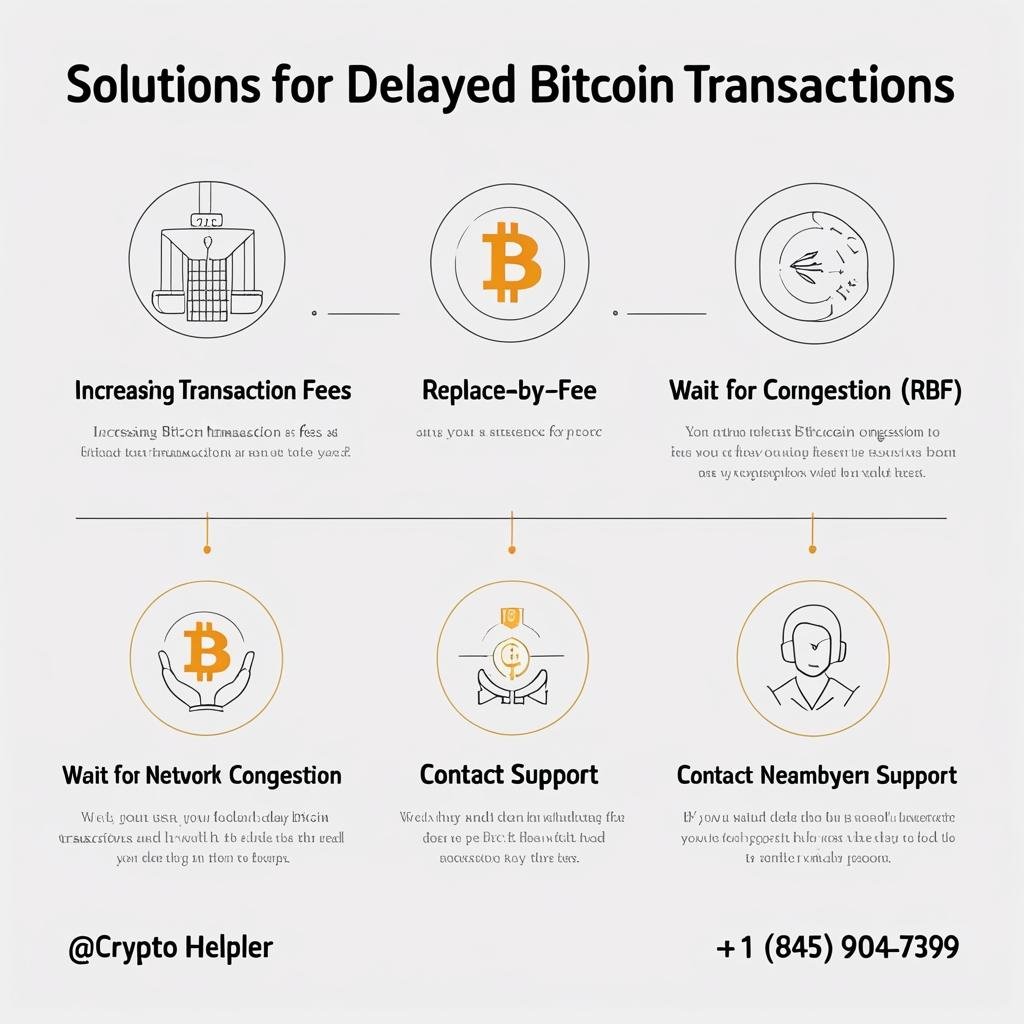
🚧 How to Prevent Bitcoin Transaction Delays in the Future
If you’ve ever had a Bitcoin transaction delayed, you know it’s not something you want to repeat. The good news? Most of these issues are preventable. With the right tools and knowledge, you can reduce your risk of having your Bitcoin transaction stuck or not confirming for hours.
📈 Always Check Network Conditions First
Before sending, visit a site like mempool.space to see if the network is congested. If there are thousands of transactions waiting, it’s likely that Bitcoin mempool issues could delay your transfer. In these cases, either wait it out or use a higher fee to avoid having your Bitcoin transaction delayed.
🔧 Use Wallets That Support Dynamic Fee Adjustment
Many issues arise because users rely on wallets that don’t allow manual fee settings. Choose wallets like Electrum or BlueWallet that let you adjust fees based on real-time conditions. This reduces the risk of a Bitcoin transaction not confirming due to underpaying miners.
⚡ Use Replace-by-Fee and CPFP Proactively
If you know your fee is borderline, send your transaction using Replace-by-Fee (RBF) from the start. That way, you’ll already have the option to raise the fee if your Bitcoin transaction is stuck. On the receiving side, CPFP can help as well — especially when you’re depending on unconfirmed inputs.
🚀 Know How to Speed Up Bitcoin Transaction Safely
Don’t wait until you’re in panic mode to figure out how to speed up a Bitcoin transaction. Learn the tools now — accelerators, fee trackers, RBF — so you’re ready if a delay ever happens again.
🧑💻 Real User Case: How One Trader Fixed a Delayed Bitcoin Transaction
Emily, a Bitcoin user from Texas, experienced a classic case of a Bitcoin transaction delayed. She attempted to send 0.05 BTC during a market surge, setting her fee at just 12 sats/vB—far below the 45 sats/vB average required at the time. As a result, her Bitcoin transaction was delayed for over 16 hours, stuck unconfirmed in the mempool.
To resolve the issue, Emily used the Replace-by-Fee (RBF) feature in BlueWallet to increase her fee to 50 sats/vB. Within minutes, the once delayed Bitcoin transaction was confirmed and processed successfully. Her situation clearly demonstrates why understanding real-time fee rates and using wallets that support dynamic fee customization are essential to avoid having your Bitcoin transaction delayed during periods of high network congestion.
📞 When to Wait, Panic, or Contact Support
Worried about a Bitcoin transaction delayed longer than expected? You’re not alone. Every day, users experience a Bitcoin transaction stuck in the mempool or completely not confirming—even after hours. But when should you actually panic and contact support?
🕒 Wait: If It’s Been Less Than an Hour
Most Bitcoin transaction delays within the first 60 minutes are normal, especially if there’s high network traffic. Short-term Bitcoin mempool issues can cause brief confirmation delays. Check the average fee rate—if yours was below it, this could be why your Bitcoin transaction is not confirming right away.
⚠️ Monitor Closely: After 2–3 Hours
If your Bitcoin transaction is still delayed after a few hours, go to mempool.space and check the status. You might see that your Bitcoin transaction is stuck due to a low fee or a full mempool. This is where knowing how to speed up a Bitcoin transaction becomes crucial. Use RBF, CPFP, or accelerators to boost your fee and rebroadcast the transaction.
📣 Contact Support: If It’s Been Over 24 Hours
A Bitcoin transaction delayed for over a full day without any confirmation should not be ignored. Reach out to the support team of your wallet or exchange. In some cases, it’s not just Bitcoin mempool issues—the transaction may not have been broadcasted properly, or the system may have glitched.
When you’ve tried everything and your Bitcoin transaction is still stuck, contacting support is the smart move. Ask them to verify broadcast status or walk you through how to speed up your Bitcoin transaction securely.
🎯 Final Thoughts: Take Control of Your Bitcoin Transactions
Experiencing a Bitcoin transaction delayed is frustrating, but you’re not alone—and you’re not stuck forever. Whether your Bitcoin transaction is not confirming, stuck in the mempool, or just slow to appear, the most important thing is knowing what steps to take.
From fee miscalculations to overwhelming Bitcoin mempool issues, many delays are caused by common user errors or temporary network spikes. But now that you understand what’s happening behind the scenes, you’re equipped with the knowledge to act fast. If your Bitcoin transaction is stuck, you now know about Replace-by-Fee (RBF), CPFP, and fee accelerators that can get things moving again.
And if you’re wondering how to speed up Bitcoin transaction confirmations in the future—it’s all about being proactive. Check network conditions, use dynamic fee wallets, and always confirm that your transaction was properly broadcasted.
So the next time you face a Bitcoin transaction delayed or not confirming, don’t panic—fix it. With the right tools and knowledge, you can take control of your crypto experience and never feel stuck again.
🔗 Related Resources from CryptoHelpler
Explore our most helpful Cash App and Bitcoin guides:
- ✅ Hassle-Free Bitcoin Verification on Cash App
- 🔓How to Easily Setup and Restore Mycelium Wallet
- 💰 How to Buy Bitcoin on Cash App
- ⚠️How to Send Money Using a Bitcoin ATM
- 🛠️ Cash App Verification Issues
❓ Frequently Asked Questions About Bitcoin Transaction Delays
🔁 Why is my Bitcoin transaction delayed?
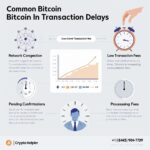
A Bitcoin transaction delayed usually means the network is congested or your fee is too low. When miners prioritize higher-fee transactions, yours may sit unconfirmed in the mempool. It’s a common issue, especially during high traffic periods. If your Bitcoin transaction is stuck in the mempool for hours, it may require action.
⏳ What should I do if my Bitcoin transaction is not confirming?

If your Bitcoin transaction is not confirming after an hour, check the current fee rate and mempool size. You may need to rebroadcast using a higher fee via Replace-by-Fee (RBF) or use a transaction accelerator. A Bitcoin transaction delayed for multiple hours should never be ignored.
🚧 What causes a Bitcoin transaction to get stuck?

The main reason a Bitcoin transaction is stuck is an insufficient fee. If your wallet didn’t calculate the optimal fee, or you sent it during a network spike, your transaction can remain unconfirmed. Learn how to speed up Bitcoin transaction confirmations to prevent this issue.
📉 What are Bitcoin mempool issues and how do they affect me?
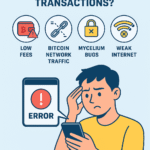
Bitcoin mempool issues occur when thousands of unconfirmed transactions pile up. During these periods, only the highest-fee transactions get confirmed, leaving low-fee ones stalled. This is the #1 reason behind a Bitcoin transaction not confirming on time.
⚡ How to speed up Bitcoin transaction confirmations?
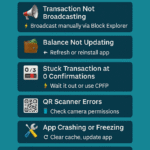
To resolve delays, you must understand how to speed up Bitcoin transaction times. Options include using RBF, CPFP, and fee accelerators. These are vital tools when facing a Bitcoin transaction delayed due to network congestion or wallet misconfiguration.
